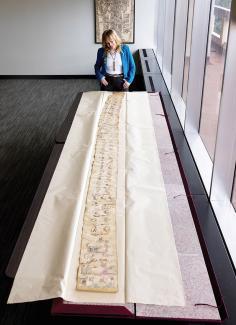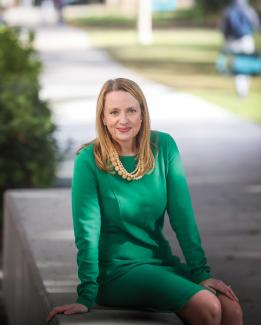Anita Raj
Anita Raj had no intentions of leaving San Diego. She and her husband, Jay Silverman, had jobs they loved at the University of California at San Diego (UCSD), both serving as distinguished scholars in the UCSD School of Medicine.
But then the search firm assisting Tulane University in finding the next executive director of Newcomb Institute sent her a description of the position, and that’s when everything changed.
“We were going to retire in San Diego,” Raj said. “But then I looked at the job and I didn’t say anything. I forwarded the email to my husband, and he said, ‘You have to apply.’ Uprooting your life — a life you are happy with — is a big deal. And it would have to take a very special position to do that. This was that special position.”
In their statement announcing Raj as Newcomb Institute’s next executive director and the Nancy Reeves Dreux Endowed Chair at the Tulane School of Public Health and Tropical Medicine, Tulane President Michael A. Fitts and Provost Robin Forman hailed Raj as an innovative leader, author, researcher, and voice for racial and gender inequalities, violence prevention and public health initiatives.
Her research, including epidemiologic and intervention studies, focuses on sexual and reproductive health, maternal and child health, women’s empowerment and gender inequalities, including gender-based violence and child marriage. Raj has 300 peer-reviewed publications. Her work has been featured in major media outlets in the United States, the United Kingdom and India.
In her first six months at Tulane, she has already made a name for herself, releasing the results of a survey on violence in Louisiana. Titled the Louisiana Study on Violence Experiences Across the Lifespan (LaVEX), the study says that more than half of Louisiana residents experience physical violence in their lifetime, and about one in five are threatened or harmed with a gun. Louisiana is only the second state in the nation to acquire this level of violence data and the first in the Southeast. She conducted a similar study in California.
Raj said she was proud of the media response to the study, which also revealed that 42% of women experience violence at the hands of romantic or sexual partners.
“The level of response was far more than what I anticipated,” she said. “I never imagined that I’d be presenting at the State Capitol in Baton Rouge, and I never imagined that I’d be on so many radio shows and TV in such a short time. It shows you the reputation of Newcomb as well as the readiness of the state of Louisiana and the city to use data to address these issues. To me, that’s very exciting.”
It is that kind of research that appealed to Raj when she was considering the job. She was well aware of Newcomb Institute’s reputation, and the history of Newcomb College convinced her that this was where she wanted to continue her work. That the job was in one of her favorite cities clinched the deal.
A native of Jackson, Mississippi, Raj was a regular visitor to New Orleans as a child, mostly on school field trips. When it came time to apply to college as a 16-year-old, she chose Newcomb. “I was drawn to the idea of being in a place where differences were valued and enjoyed,” she said. “But at that age, I was way too young to manage the freedom.”
She later enrolled at and graduated from Mississippi College, then moved to Athens, Georgia, where she earned both her master’s degree and PhD in psychology at the University of Georgia. It’s also where she met her husband, who is now a professor and leading global health researcher at the Tulane School of Public Health and Tropical Medicine.
“I loved California,” said Raj, who continues to hold a faculty appointment at UCSD. “But to me, being at Newcomb, in this place, at this time, just felt so right. I wanted to be part of that.”


































































